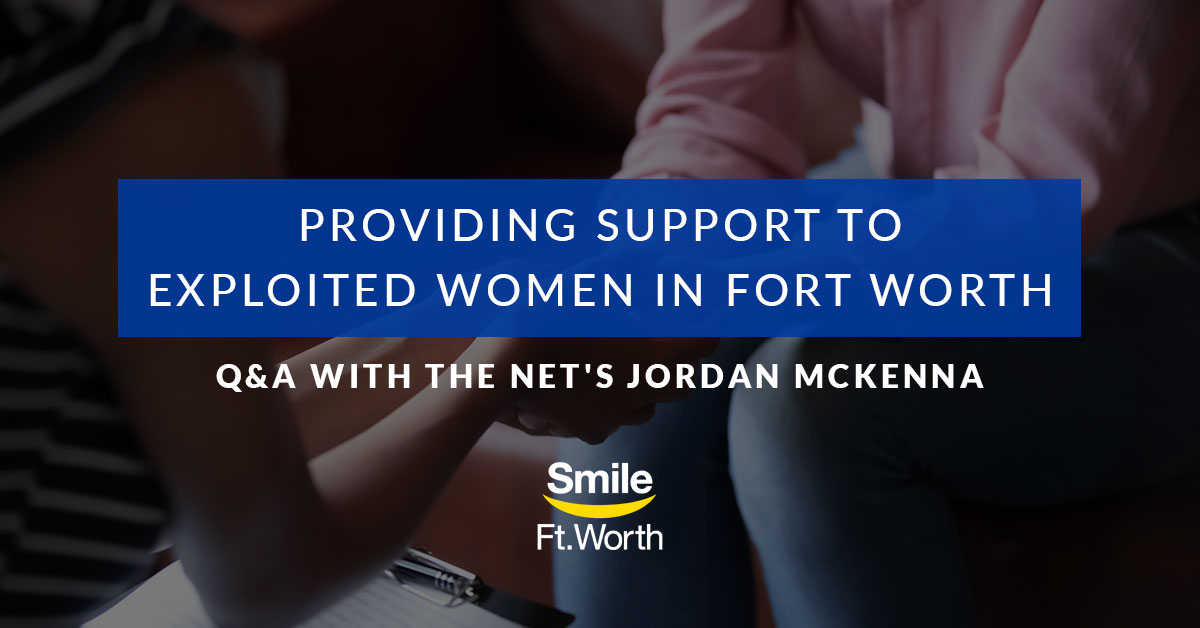At Smile Fort Worth, giving back to our community is at the heart of everything we do. That’s why we’re honored to partner with The Net—an organization that helps victims of trafficking find the path toward freedom. Today we are chatting with Jordan McKenna, their Director of After Care, to hear a little about their inspiring work and ways everyday people can help trafficking victims in our community.
Could you give me a quick overview of The Net and what y'all do?
At The Net, we address sex trafficking and support survivors because we believe everyone is worthy of the chance to rebuild their life.
One of the core things we do is walk hand-in-hand with and provide adult survivors of sexual exploitation holistic support on their journey to recovery.
What's your favorite thing about your job?
I love becoming friends with the women that we serve. We’re a community and we base everything we do on equality. Like, I had some of the ladies in our program come to my wedding. Some of the ladies are my daughter’s “aunties,” as they like to call themselves. I meet them at the jail to see them at their hardest place in life, and I get a front row seat to see them break down barriers and start beginning to see their self-worth.
How did The Net get started?
Originally, we started serving people experiencing homelessness. Then, as we began building relationships with people experiencing poverty, one thing that continued being a theme amongst women was the issue of them experiencing sexual exploitation and all of the vulnerabilities that came with women being in poverty.
And in that same time period, our founder, Melissa Ice, had gone overseas in the red light districts and saw the sex trafficking that was happening abroad, and she started to put two and two together and realized, “Oh, that’s happening here in Fort Worth.”
What is Human Trafficking?
So in the journey of our development, Melissa and others started learning more about the sexual exploitation of women and human trafficking. And what they discovered is that there is a clear overlap between prostitution and trafficking.
A lot of people see those as two different things. But actually, according to research, the average age of entry to the sex industry is now 11-14 years old. And according to the government, any commercial sex act performed under the age of 18 is considered trafficking.
What we found was that the average woman in prostitution is actually the victim of sex trafficking, but they just slipped through the cracks as they became adults.
How Often Is Sex Trafficking Happening In Fort Worth?
Unfortunately, there’s not a lot of statistics on human trafficking. One of the things that’s hard about gathering data in this realm is that most victims don’t see themselves as victims.
I can tell you that The Net has served over 1,000 survivors in Fort Worth since 2012. We average about 200 survivors per year that we come in contact with and offer services. And that’s just the ones who are currently incarcerated.
But, we only know a vast majority of those women because we visit the jails and are put into contact with them. That doesn’t encompass the women who haven’t been incarcerated or don’t come forward because they’re too afraid. It’s an extremely widespread problem that I don’t think our community is fully aware of.
Is there anything about how the media portrays trafficking victims that feels inaccurate?
A big problem is sensationalism. Specifically, you’ll see a picture of a girl who’s sad, and she’s in chains and that’s supposed to represent human trafficking. My gosh, on social media these videos go viral. It’ll be a mom in a parking lot, and there’s some person who’s following too closely behind her, and she’ll say, “I was almost trafficked.” I’m sure that was a really scary situation, but that’s not what trafficking looks like for the vast majority of women.
The reason that sensationalism is harmful is that not only does it give an inaccurate view of what trafficking is, but it makes it almost impossible for survivors to view themselves as victims. They see girls in chains or creepy people in the parking lot kidnapping women, and they’ll say to themselves, “I’m not in chains” or “I wasn’t kidnapped.” It hinders victims to be able to accurately identify themselves as victims when we sensationalize what trafficking looks like.
So, it’s super important for the public to really understand what trafficking is. We do training twice a year to educate the public on trafficking and what it specifically looks like in Fort Worth, and I highly recommend people attend.
Can you tell me about The Net's different programs?
So, now we have three programs. First, there’s our Purchased Program, which is our direct service provider for survivors. Then, we have our MASE program, which is our Men Against Sexual Exploitation, and that kind of deals with the demand side of the sex industry. In that program we do online disruptions for men who are attempting to purchase sex. Finally, we have the Worthy Co., which is our social enterprise to employ survivors.
What challenges are you trying to address with MASE?
Each program was born out of seeing challenges. Specifically, with MASE, we realized that the sex trafficking industry is an industry. It’s basic economics 101—supply and demand. Hypothetically, we could rescue survivors and every victim on the street, but what’s going to happen? There’s going to be a new crop of women on the streets the next day. Because here’s the thing: where there’s a demand for something, there will always be a supply.
So, what we wanted to do was address the issue of sex trafficking in a holistic way, which meant we needed to develop an approach that helped survivors but also address demand and the men who are purchasing women.
Can you tell me a little more about the mission behind the Purchased Program?
There’s kind of a breakdown within our Purchased Program. So, we have our jail outreach program, which is where we go to the jail weekly and meet with women who have a history of trafficking and prostitution. We start building relationships, let them know that there are people who care, and offer them an on-ramp into our services if that’s what they choose to do. Our goal isn’t to try to force women to stop doing what they’re doing. Rather, it’s to let them know that they’re loved, that they’re worthy, and that there are people who are here for them when they are ready.
We also teach empowerment classes inside of the Tarrant County Jail (obviously that’s on pause because of COVID), but we’ve been doing that for five years.
Then, we have our partnership with the RISE program (Reaching Independence Through Self Empowerment). Each of the women in that program is paired with an advocate trained by us. This is a person who commits to walking alongside them for at least two years. We don’t like to use the term “mentor” because that insinuates that there’s someone above you. We call them “advocates,” but ultimately, they are friends. They’re a person who they can call when things are hard or they can celebrate when things go well, go get a coffee with, or go get your nails done together.
Finally, we have a weekly survivor support group. It starts with a shared meal and is a place for an honest conversation led by survivor leaders. I lead that with my colleague who is a survivor.
What is Worthy Co.?
It’s a social enterprise within the umbrella of the Net, but it’s a business. As a nonprofit, 100% of the profits go into serving and employing our survivors. We have five women employed right now. They hand make jewelry and hand pour candles. We also have a candle-pouring class that the public can come to that’s kind of like painting with a twist.
Worthy Co. was really born out of walking alongside survivors. We realized that because of their background, gainful employment that was necessary to maintain their life was nearly impossible to obtain and was one of the biggest triggers for them to relapse.
Every time they fill out an application they come across that line, “Do you have any felonies?” And a vast majority of women in our program have prostitution on their record, which carries a stigma. Or they have theft, which is almost always a no-go for most employers. We also work with women who have been sex trafficking victims since they were fifteen. So, when maybe you and I were getting our first job at a restaurant hostessing or at a retail store, they were having to sell their bodies.
We started Worthy Co. because we wanted to give women a launchpad for them to be able to have gainful employment and careers. We wanted to employ survivors and give them the soft skills that you and I learned at our first jobs, like how to be at work on time or how to budget your money. I mean, most of our ladies didn’t even have a bank account up until this point. So, we wanted to teach them those skills in a trauma-informed, safe and healthy environment where there’s lots of room for growth and forgiveness while they’re learning.
But, it’s also a therapeutic environment. They can use their hands and create beautiful things. There are also places for upward mobility within Worthy Co. They can start working in retail, shipping and receiving, and other roles like that. Plus, when they’re ready to move on, they have references.
We had one lady who started at Worthy Co, who was our jewelry-making queen, and she was doing awesome. Eventually, she was ready to launch her career. Now she’s an independent contractor for a roofing company, and she’s doing so well. My husband’s a real estate agent, and they work with each other and give each other referrals. It’s awesome because she’s such a businesswoman now—and that was our whole hope. We want to show these women that they have skills, have a lot to offer, and can reach whatever goals they want to reach if they put in the work.
How Can People Help?
I want to recognize that not everyone has the ability to serve or volunteer. But, everyone has the ability to get involved in some way, shape, or form. So, for those who are interested in getting involved—whether it’s walking along with a survivor, doing jail outreach, or being a MASE advocate— we have mandatory training coming up for anyone who wants to participate. It’s on Saturday, Feb. 5, which you can register for online. You’re not committing to being a volunteer by attending, but it’s a great way to learn more about trafficking and specifically what it looks like in our city.
And of course with the Worthy Co., we want to employ more survivors, so everyone should shop!
How can businesses help?
What we need most is people to partner with us financially. We do not take federal or state funding, we are funded primarily with generous people and businesses who partner with us. So, anyone who wants to partner with us, we are so grateful for it.
For instance, finding dental services through Smile has been a huge help to us because it radically transformed how these women view themselves.
Because of their background, they’ve had to use drugs as a coping mechanism, so their teeth are destroyed. It’s so hard when there’s so much internal transformation going on, yet they still have scars of their past on them. This also causes people to judge and make assumptions about a person based on their looks. After receiving dental help from Smile, the transformation that they’ve done inside during their recovery starts reflecting what they look like on the outside.
We had a survivor who got dental work through Smile, and she didn’t have any teeth. But oh my gosh! She just got married and she was smiling ear-to-ear on her wedding day and on her business cards. Before, she would never open her mouth to smile because she just felt so much shame about her teeth. So, teeth are a huge huge thing we’re asked about a lot by the ladies because it’s one of their biggest insecurities.
Smile is stepping up, so can you!
Smile Fort Worth is stepping up to help The Net in its mission to help these women look and feel their best by restoring their smiles and giving them a new lease on life.
And there’s plenty of ways you can support these women on their journey to freedom too! You can learn more about The Net and ways to get involved here.





Recent Comments